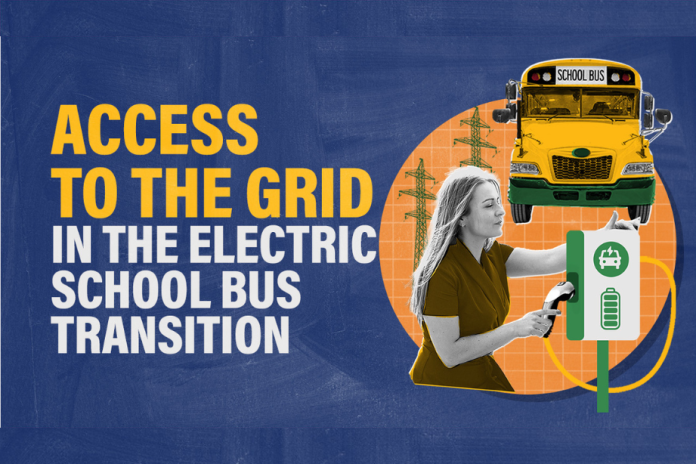The Electric School Bus Transition Must Take Inequitable Electric Grids into Account
How can you help electric school buses contribute to a more stable and more equitable grid?

Electric school buses rely on and impact the electric grid. However, grid infrastructure does not serve all communities equally. In some areas, inequitable grid investment means that predominantly white communities and higher income communities experience fewer power outages. In other areas, outdated grids make it more difficult to invest in distributed grid resources like electric vehicles (EVs) – leaving some communities behind in the energy transition.
How Electric School Buses Impact the Grid
Charging infrastructure is a central aspect of electric school bus deployment and it can entail grid upgrades. If utilities proactively engage with school districts to conduct site assessments and look for opportunities to improve energy efficiency, they can direct grid investments to places that need them the most. Prioritizing upgrades in communities that have been historically underserved can help ensure they have better access to clean, reliable energy in the future.
Adding electric school buses to a site can also play a role in improving grid capacity. With their predictable use patterns and consistent long stretches in parking facilities, electric school buses can serve as grid assets through managed charging or vehicle-to-grid applications and reduce electrical load peaks. This service could help to create a more reliable, renewable power grid in areas with electric school buses. In emergency situations, electric school buses can provide stability and capacity to the grid during emergencies by acting as community resilience hubs. These capabilities make it even more important to prioritize electric school bus deployment in underserved areas.
How You Can Improve Your Grid
School districts: Ask your utility about considering long term investments for both electric school buses and other distributed grid resources.
- Ask your utility about conducting a site assessment and determine if there are ways to improve energy efficiency, invest in solar panels for charging or use managed charging to distribute the load evenly.
- Look into existing make-ready programs offered by your utility to help with infrastructure both in front of, and behind, the service meter.
Utilities: Prioritize working with underserved communities by actively reaching out to districts, spending time to educate district employees and providing opportunities for financial partnerships.
- Actively reach out to school districts in underserved communities to conduct site assessments and provide technical assistance and education around the new charging infrastructure.
- Consider using managed charging on electric school buses to help evenly distribute the grid load, using EVs as emergency energy generators and investing in grid upgrades that will allow for a larger shift to clean energy.
- Become a financial partner for school districts by providing vehicle and infrastructure rebates and incentives, creating make-ready programs, providing EV-specific rates and participating in other innovative financing models.
- Help the school district to future-proof their investments by setting a long-term project goal for the number of buses and renewable assets and pre-building the infrastructure upfront.
Policymakers: Encourage utilities to invest in equitably distributed and sited infrastructure.
- Prioritize grid upgrades and enabling policies in communities that have been historically underserved.
- Seek, address and incorporate community input, particularly at the local level.
- Develop incentives, such as rebates, rates and reimbursements, for using electric school buses as distributed energy resources or managed load assets.
Where You Can Learn More
- Embedding Equity in Utility Transformations - SEPA
- All About Managed Charging and “Vehicle-to-Everything” or V2X - WRI’s Electric School Bus Initiative
- Electric Vehicle Make-Ready Programs - WRI’s Electric School Bus Initiative
- 3 Design Considerations for Electric School Bus Vehicle-to-Grid Programs -WRI’s Electric School Bus Initiative
- Power Planner for Electric School Bus Deployment- WRI’s Electric School Bus Initiative
- Unlocking the power of school transportation to build resilience and a clean energy future - PIRG